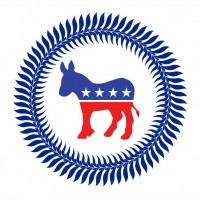Maybe it’s the lack of more than a handful of places to shop, of a sparkling downtown, of fancy events, of more than a few nice restaurants, but you can forget that there’s money in this town. Old money. Not like the money in Seattle, Dallas, or even Denver, say, and it doesn’t present itself like it does in those places, but it’s here, and on Tuesday night, much of it was concentrated in a house in downtown Anchorage with a killer view of the Cook Inlet.
The house belongs to Bill and Michelle Bittner, who opened their home to Dan Coffey to announce that he’s running for mayor in 2015. Bill is an Anchorage boy and like many in the room, grew up with Coffey. He’s a brilliant lawyer, and he’s easy company. You want to tell him things. And Michelle looks like she just walked out of a commercial for women who want to look like they just walked out of a commercial effortlessly.
Anyway, this isn’t a piece about the Bittners, though I could spend time on them on page forever. This is a piece about those who helped build this city, about misconceptions, and about Dan Coffey.
You’ll likely not find many of the people who showed on Tuesday night at other political fundraisers. It might be true that Republicans generally have the lock on the business vote, and that trial lawyers vote Democrat, but successful people tend not to be ideologues, and most have better things to do with their evenings than go to fundraisers.
But Coffey is one of their own. He’s from the Anchorage class of 1964, and give or take a few years, so were many of the people at the party. LIke Coffey, many of them or their parents came to Alaska to find and help build a new city. They built the banks, the stores, the insurance and construction companies, the businesses that create a community.
Among the 100 or so present was Dan Cuddy, president of the homespun First National Bank. There was Bob Mintz, who manages the Carr Gottstein properties. Bill Odom, whose father more than 70 years ago founded Odom Corp., one of the biggest wholesale beverage distribution companies in the Pacific Northwest. John McManamin showed. The McManamin family owns some of the most valuable land in the city. Businessman Mike Renfro was there. Chris and Mike Swalling were there. Their father, Al, brought Coffey from Seattle to Anchorage when he was six days old and handed him over to his adoptive parents. Mary Hughes was there. The infamous Bob Gilliam wasn’t there, but he’ll show eventually. He was, after all, in that class of 1964.
Current Mayor Dan Sullivan introduced and endorsed Coffey.
I had never seen most of these people, and political consultant Marc Hellenthal had to help me figure out who was who. Hellenthal grew up with Coffey and is from one of those old Anchorage families.
Coffey couldn’t be missed, however. He’s got a presence, as people who get things done often do. He sometimes doesn’t know when to tone that presence down, and it has gotten him in trouble more than a few times in the past.
“I think I can offer something,” he told me. “I think I can make this a better place to live,” he said, as if it were a new idea to him. Prior to Tuesday night, I only knew Coffey by reputation, and one thing I wouldn’t have guessed about him is how sincere he can be.
Turns out there is a lot about him that I didn’t know. Although he maybe a lawyer to the liquor lobby, he’s also a recovering alcoholic who hasn’t had a drink for more than 30 years. I didn’t know that he was a registered Democrat before changing to independent when he ran for Anchorage Assembly. I knew that he has a reputation as a fiscal conservative, but I didn’t know that at heart, he’s a social liberal, particularly when it comes to the homeless and the poor.
Mostly it didn’t occur to me how much courage it takes for him to run. He’s got long history here, and he’s going to be put under a microscope, slammed by his opponents and criticized by the media (maybe even by me), and he knows it and yet he’s still going for it. Why? He doesn’t need the money or the prestige or the name recognition. After all, there’s already a street named after his family.
Coffey said that Anchorage has been good to him, to his family, and to many of the families in the room. He wants others to have the opportunities that they all had. His friends, those who showed on Tuesday night, understood.
Contact Amanda Coyne at amandamcoyne@yahoo.com


 Gov. Sean Parnell makes $145,000 a year. The Alaska State Compensation Commission this week has recommended Parnell’s compensation be increased almost $6,000 to $150,872.
Gov. Sean Parnell makes $145,000 a year. The Alaska State Compensation Commission this week has recommended Parnell’s compensation be increased almost $6,000 to $150,872.








